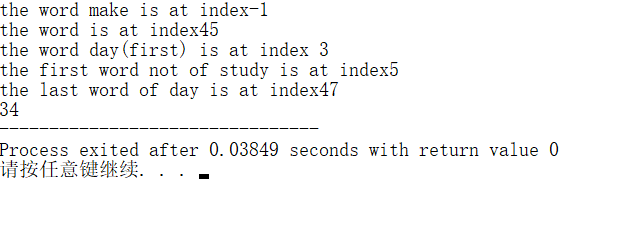C++string类总结
一、string的初始化
首先,为了在程序中使用string类型,必须包含头文件 <string>。如下:
#include <string>
注意这里不是string.h,string.h是C字符串头文件。
string类是一个模板类,位于名字空间std中,通常为方便使用还需要增加:
using namespace std;
声明一个字符串变量很简单:
string str;
测试代码:
#include <iostream>
#include <string>
using namespace std;
int main ( )
{
string str; //定义了一个空字符串str
str = "Hello world"; // 给str赋值为"Hello world"
char cstr[] = "abcde"; //定义了一个C字符串
string s1(str); //调用复制构造函数生成s1,s1为str的复制品
cout<<s1<<endl;
string s2(str,6); //将str内,开始于位置6的部分当作s2的初值
cout<<s2<<endl;
string s3(str,6,3); //将str内,开始于6且长度顶多为3的部分作为s3的初值
cout<<s3<<endl;
string s4(cstr); //将C字符串作为s4的初值
cout<<s4<<endl;
string s5(cstr,3); //将C字符串前3个字符作为字符串s5的初值。
cout<<s5<<endl;
string s6(5,'A'); //生成一个字符串,包含5个'A'字符
cout<<s6<<endl;
string s7(str.begin(),str.begin()+5); //区间str.begin()和str.begin()+5内的字符作为初值
cout<<s7<<endl;
return 0;
}
程序执行结果为:
Hello world
world
wor
abcde
abc
AAAAA
Hello
二、string的比较等操作
你可以用 ==、>、<、>=、<=、和!=比较字符串,可以用+或者+=操作符连接两个字符串,并且可以用[]获取特定的字符。
#include <iostream>
#include <string>
using namespace std;
int main()
{
string str;
cout << "Please input your name:"<<endl;
cin >> str;
if( str == "Li" ) // 字符串相等比较
cout << "you are Li!"<<endl;
else if( str != "Wang" ) // 字符串不等比较
cout << "you are not Wang!"<<endl;
else if( str < "Li") // 字符串小于比较,>、>=、<=类似
cout << "your name should be ahead of Li"<<endl;
else
cout << "your name should be after of Li"<<endl;
str += ", Welcome!"; // 字符串+=
cout << str<<endl;
for(int i = 0 ; i < str.size(); i ++)
cout<<str[i]; // 类似数组,通过[]获取特定的字符
return 0;
}
程序执行结果为:
Please input your name:
Zhang↙
you are not Wang!
Zhang, Welcome!
Zhang, Welcome!
上例中,“ cout<< str[i]; ”可换为: cout<< str.at(i);
三、string特性描述
可用下列函数来获得string的一些特性:
int capacity()const; //返回当前容量(即string中不必增加内存即可存放的元素个数)
int max_size()const; //返回string对象中可存放的最大字符串的长度
int size()const; //返回当前字符串的大小
int length()const; //返回当前字符串的长度
bool empty()const; //当前字符串是否为空
void resize(int len,char c); //把字符串当前大小置为len,多去少补,多出的字符c填充不足的部分
测试代码:
#include <iostream>
#include <string>
using namespace std;
int main()
{
string str;
if (str.empty())
cout<<"str is NULL."<<endl;
else
cout<<"str is not NULL."<<endl;
str = str + "abcdefg";
cout<<"str is "<<str<<endl;
cout<<"str's size is "<<str.size()<<endl;
cout<<"str's capacity is "<<str.capacity()<<endl;
cout<<"str's max size is "<<str.max_size()<<endl;
cout<<"str's length is "<<str.length()<<endl;
str.resize(20,'c');
cout<<"str is "<<str<<endl;
str.resize(5);
cout<<"str is "<<str<<endl;
return 0;
}
程序执行结果为:
str is NULL.
str is abcdefg
str's size is 7
str's capacity is 15
str's max size is 4294967294
str's length is 7
str is abcdefgccc
str is abcde
四、string的查找
由于查找是使用最为频繁的功能之一,string提供了非常丰富的查找函数:(注:string::npos)
size_type find( const basic_string &str, size_type index ); //返回str在字符串中第一次出现的位置(从index开始查找),如果没找到则返回string::npos
size_type find( const char *str, size_type index ); // 同上
size_type find( const char *str, size_type index, size_type length ); //返回str在字符串中第一次出现的位置(从index开始查找,长度为length),如果没找到就返回string::npos
size_type find( char ch, size_type index ); // 返回字符ch在字符串中第一次出现的位置(从index开始查找),如果没找到就返回string::npos
注意:查找字符串a是否包含子串b,不是用 strA.find(strB) > 0 而是 strA.find(strB) != string:npos 这是为什么呢?(初学者比较容易犯的一个错误)本部分参考自web100与luhao1993
先看下面的代码
int idx = str.find("abc"); if (idx == string::npos);
上述代码中,idx的类型被定义为int,这是错误的,即使定义为 unsigned int 也是错的,它必须定义为 string::size_type。npos 是这样定义的: static const size_type npos = -1; 因为 string::size_type (由字符串配置器 allocator 定义) 描述的是 size,故需为无符号整数型别。因为缺省配置器以型别 size_t 作为 size_type,于是 -1 被转换为无符号整数型别,npos 也就成了该型别的最大无符号值。不过实际数值还是取决于型别 size_type 的实际定义。不幸的是这些最大值都不相同。事实上,(unsigned long)-1 和 (unsigned short)-1 不同(前提是两者型别大小不同)。因此,比较式 idx == string::npos 中,如果 idx 的值为-1,由于 idx 和字符串string::npos 型别不同,比较结果可能得到 false。因此要想判断 find()等查找函数的结果是否为npos,最好的办法是直接比较。
测试代码:
#include<iostream>
#include<string>
using namespace std;
int main(){
int loc;
string s="study hard and make progress everyday! every day!!";
loc=s.rfind("make",10);
cout<<"the word make is at index"<<loc<<endl;//-1表示没找到
loc=s.rfind("make");//缺省状态下,从最后一个往前找
cout<<"the word make is at index"<<loc<<endl;
loc=s.find_first_of("day");
cout<<"the word day(first) is at index "<<loc<<endl;
loc=s.find_first_not_of("study");
cout<<"the first word not of study is at index"<<loc<<endl;
loc=s.find_last_of("day");
cout<<"the last word of day is at index"<<loc<<endl;
loc=s.find("day");//缺陷状态下从第一个往后找
cout<<loc;
return 0;
}
运行结果:

五、其他常用函数
string &insert(int p,const string &s); //在p位置插入字符串s
string &replace(int p, int n,const char *s); //删除从p开始的n个字符,然后在p处插入串s
string &erase(int p, int n); //删除p开始的n个字符,返回修改后的字符串
string substr(int pos = 0,int n = npos) const; //返回pos开始的n个字符组成的字符串
void swap(string &s2); //交换当前字符串与s2的值
string &append(const char *s); //把字符串s连接到当前字符串结尾
void push_back(char c) //当前字符串尾部加一个字符c
const char *data()const; //返回一个非null终止的c字符数组,data():与c_str()类似,用于string转const char*其中它返回的数组是不以空字符终止,
const char *c_str()const; //返回一个以null终止的c字符串,即c_str()函数返回一个指向正规C字符串的指针, 内容与本string串相同,用于string转const char*
测试代码:
#include <iostream>
#include <string>
using namespace std;
int main()
{
string str1 = "abc123defg";
string str2 = "swap!";
cout<<str1<<endl;
cout<<str1.erase(3,3)<<endl; //从索引3开始的3个字符,即删除掉了"123"
cout<<str1.insert(0,"123")<<endl; //在头部插入
cout<<str1.append("123")<<endl; //append()方法可以添加字符串
str1.push_back('A'); //push_back()方法只能添加一个字符
cout<<str1<<endl;
cout<<str1.replace(0,3,"hello")<<endl; //即将索引0开始的3个字符替换成"hello"
cout<<str1.substr(5,7)<<endl; //从索引5开始7个字节
str1.swap(str2);
cout<<str1<<endl;
const char* p = str.c_str();
printf("%s\n",p);
return 0;
}
程序执行结果为:
abc123defg
abcdefg
123abcdefg
123abcdefg123
123abcdefg123A
helloabcdefg123A
abcdefg
swap!
swap!



 浙公网安备 33010602011771号
浙公网安备 33010602011771号